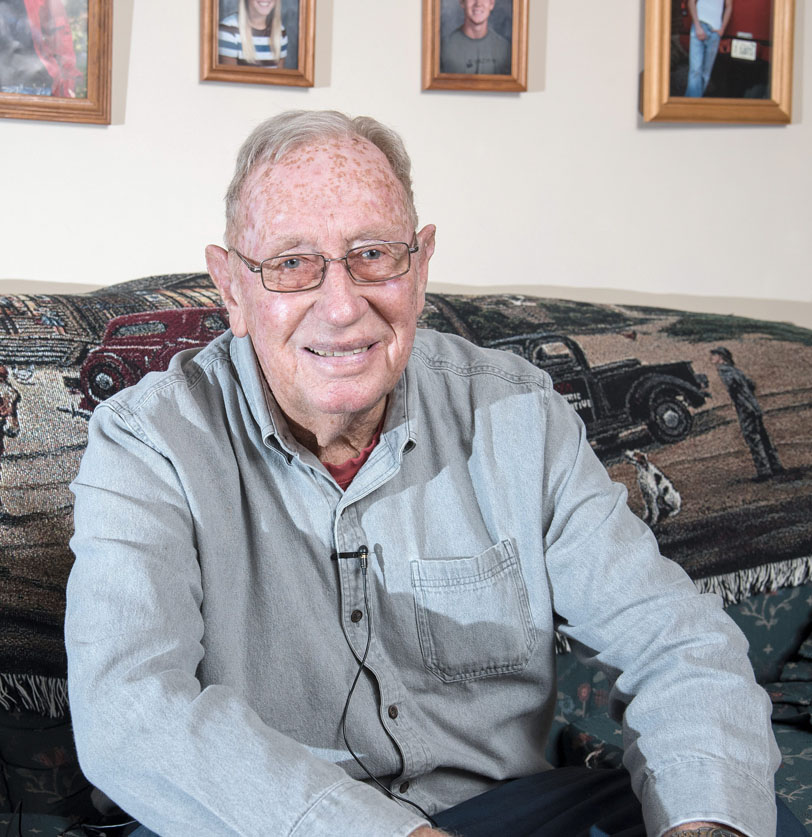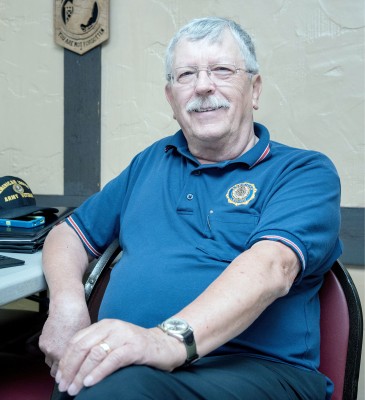Ernest Sjuts
By Paul Wood

Photo By Rick Danzl/The News-Gazette
FLATVILLE — Ernest Sjuts served in Austria when the Iron Curtain separated the Soviet bloc from Western Europe.
It was in the early 1950s, and there was Cold War paranoia about a third world war.
The orders came to Sjuts’ artillery group:
“Our mission: If the Russians came running across the border, we were supposed to slow them down,” he said.
Sjuts is 83, so obviously that lethal invasion never happened. He lives on a farm near several family members in the Royal/Flatville area.
The Sjuts family spoke some German, like many in the area, where ancestors had come from a part of Germany where people speak Plattdeutsch, or low German.
During World War II when many met their death at the hands of Nazi Germany, his father warned him, “Don’t speak no German in town.”
Drafted in 1953, he served for two years in the Army’s artillery in Europe, where the Soviets were sometimes only a river crossing away.
Sjuts said his March 11, 1953, departure in the waning days of the Korean War was one of the largest-ever single days of draftees sent out from Champaign County.
It turned out he’d just missed the armistice for the war in Korea by a few weeks.
Sjuts had left school at 16 to work on his father’s 320 acres — he got his degree from St. Joseph-Ogden High School in 2012 with his granddaughter — and it was a shock to face drill instructors who’d shout right in your face for chewing gum.
From Fort Sheridan, north of Chicago, he was sent to Arkansas.
His artillery unit was in the New York City area for 30 days before taking a ship across the Atlantic and then to a unit in Austria.
Suddenly, before shipping out, there was a lot of freedom for the soldiers.
“It was a heck of an experience for a cocky kid,” he said. The soldiers drank “Little Joe” shortie bottles of Schlitz beer that cost $3 — a lot of money in 1953.
He made the best friend of his entire life right away, Donald Barron, a Missouri native who now lives near Hoopeston.
Sjuts was sent to non-commissioned officer school in Vienna, becoming a staff sergeant in 1954 and running a section of soldiers who manned a 105-millimeter howitzer, working with high explosive powder bags.
He found life in Austria interesting, a whole new culture with a language he sort of knew.
Among things different from his New York shipping out experience: plentiful and inexpensive Stiegl beer from Salzburg.
“Two bottles could knock you out,” Sjuts said. “It was 16 percent alcohol.”
Sjuts was often in a truck, performing perimeter defense on maneuvers in Germany.
But much of the time, the posting was relatively calm, he said, provided there was no Soviet-NATO confrontation.
“The Army is kind of a joke, unless you’re in the fight,” he said.
Being a soldier instilled both patriotism and discipline in him. He’s still a member of the American Legion Post 996 in Royal.
After 18 months abroad, Sjuts was on a troop ship heading home in February 1955.
The 14-day trip was cramped, to say the least: 3,000 soldiers bunked down five to six at a time in a narrow space.
Sjuts was powerfully moved by watching the Statue of Liberty come into view.
“It was the best thing I ever saw in my life,” he said.
He has had a successful career on a prosperous farm, which he handed over to his son.
His wife Evelyn came with two children, and he had four in the extended family.
There are 15 grandchildren who called him Opa.
Do you know a veteran who could share a story about military service? Contact staff writer Paul Wood at pwood@news-gazette.com.
Read more stories from local veterans:
 David Stangl
CHAMPAIGN — Whether it was protecting state-of-the-art weaponry or chasing after locals who’d broken through the perimet …
David Stangl
CHAMPAIGN — Whether it was protecting state-of-the-art weaponry or chasing after locals who’d broken through the perimet …
 Rudi Laufhutte
CHAMPAIGN — Rudi Laufhutte survived a childhood in Germany where U.S. bombers leveled his town, then went on to serve pr …
Rudi Laufhutte
CHAMPAIGN — Rudi Laufhutte survived a childhood in Germany where U.S. bombers leveled his town, then went on to serve pr …
 Curtis Heck
ARMSTRONG — Curtis Heck was in Vietnam in the Army’s 101st Airborne, and he saw Vietnam as a place of booby traps and un …
Curtis Heck
ARMSTRONG — Curtis Heck was in Vietnam in the Army’s 101st Airborne, and he saw Vietnam as a place of booby traps and un …